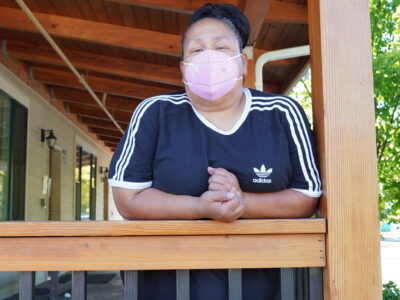Shelter Capacity Goal Exceeded
The Homeless Services Department created or sustained 460 shelter beds using Supportive Housing Services funds, including a new focused shelter at the Behavioral Health Resource Center, well above the goal of 400 beds.
FY23 data shows that the County exceeded supportive housing retention rate, racial equity, shelter, and eviction prevention goals
Multnomah County, Ore. (Nov. 6, 2023) — The Homeless Services Department released its second annual report on the Supportive Housing Services Measure — including new data that shows 99% of the 532 tenants who moved into permanent supportive housing during the Measure’s first year had remained stably housed 12 months later.
The Homeless Services Department’s strong retention rate for supportive housing — the signature investment that the Measure was named for — is among several data points tracked in the report, which builds on previously released quarterly reports and details a variety of outcomes, challenges and other trends in Fiscal Year 2022-23.
Among other highlights in the report, which was presented Monday to the Supportive Housing Services Regional Oversight Committee:
The Homeless Services Department created or sustained 460 shelter beds using Supportive Housing Services funds, including a new focused shelter at the Behavioral Health Resource Center, well above the goal of 400 beds.
The Homeless Services Department used Supportive Housing Services funds to support partners providing eviction prevention resources to 2,067 households, significantly exceeding the planned goal to serve 800 households.
The number of people rehoused out of homelessness using Supportive Housing Services funds was 1,318 in FY 2023, amounting to 30% of all Homeless Services Department-funded housing placements. That number is up from 1,129 in FY 2021-22.
Metro requires that Supportive Housing Services funds address racial disparities by serving people of color at higher rates. In FY 2023, 80% of households receiving SHS-funded services in Multnomah County were BIPOC, up from 73% the previous year.
The Homeless Services Department also spent the last quarter of FY 2023 addressing some of the well-documented spending challenges that resulted from provider capacity and workforce issues as well as necessary delays because of procurement timelines.
The Homeless Services Department finished the year having spent a comparable percentage of its Supportive Housing Services’ program budget to its regional partners — thanks to a large surge in spending in spring 2023. The Homeless Services Department ended the fiscal year having spent 65% of its program budget, ahead of Clackamas County’s 62%, but behind Washington County’s 75%. That accelerated spending by the Homeless Services Department came before work to establish a Corrective Action Plan with Metro.
“The outcomes in this year’s Supportive Housing Services annual report show what this historic measure is allowing us to accomplish,” said Daniel Field, Director of the Homeless Services Department. “As shown in the report, nearly every person who moved into permanent supportive housing last year was still in housing a year later. We’re also exceeding our goals for shelter beds, eviction prevention and racial equity. We have room to improve and grow, but these outcomes show that this measure is making a difference in our community, right now.”

"They believed in me."
Clarice, ACT RLRA Recipient
After experiencing incarceration and drug addiction, Clarice finds hope with a program that pairs mental health treatment with housing subsidies.

"I have stability here."
John, Roseway Shelter Resident
John said staying at Do Good Multnomah’s Roseway Motel Shelter has provided him with stability — and a path to housing.

"This is a new venture for us."
Kara Sydnor, Gateway Center Housing Assessor
Domestic violence center adds housing assessor position, thanks to Supportive Housing Services funding.

"It's just a matter of finding out what they need."
Takiah McCullough & Jennifer
New position funded by the SHS Measure helps bridge gap for people with intellectual and developmental disabilities experiencing homeless.

Shawn's Story from Unsheltered Homelessness to Housing
Shawn Almond, Former BHRC Participant
After four years of unsheltered homelessness, Shawn Almond discovered Multnomah County's Behavioral Health Resource Center.

"It's safety, it's security, it's comfort. It's home."
Gwyn & Dan, Tenants - Las Adelitas
Gwyn and Dan find comfort and security in permanent supportive housing at Las Adelitas.
Challenges Factor in iInitial Pace of Work
But the report also notes that workforce challenges may persist and continue to affect spending and outcomes, even amid recent investments by the Multnomah County Board of Commissioners to address gaps and add capacity in support of providers.
“One major issue has been continued challenges with our providers’ workforce. We’ve heard it for years from our providers: as Portland’s housing becomes more expensive, and as inflation drives up other costs, they aren’t able to pay their staff a living wage for the incredibly important work they do in our community,” Field wrote in the report. “That means staff at our providers are enduring many of the same challenges that have been pushing their clients onto the streets.”
The annual report notes that the Homeless Services Department has been deliberate in expanding the number of providers it contracts with, especially culturally specific providers, and has also included cost-of-living increases in provider contracts for the past couple of years. However, the annual report points out that provider capacity remains a challenge — one that has slowed the progress of the measure.
“Without a strong provider workforce, we will struggle to deliver on the full promise of this measure. Each and every one of the outcomes voters expect from us depend on that workforce. And in the first two years of implementing this measure, we’ve seen programs that weren’t able to launch as designed, and dollars that remained unused, simply because our providers didn’t have capacity,” Field wrote in the report.
The annual report points out that the SHS measure required a rapid expansion of the local homeless services system, during a time when service providers and government agencies were responding to the COVID-19 pandemic and working to reduce its impact on homeless residents and other vulnerable populations — another challenge in implementing the measure.
Executive authority and emergency steps to increase urgency and effectiveness
In light of those challenges, the report outlines steps the Homeless Services Department and elected officials have taken to increase the urgency and effectiveness of the implementation of the measure.
One accomplishment noted in the annual report is the Corrective Action Plan created with Metro, which aims to address Multnomah County’s past underspending of SHS dollars.
“The corrective action plan is providing the Homeless Services Department with a path forward for addressing underspending from the previous fiscal year, outlining immediate investments that will help ensure these unspent dollars are put to use in our community,” the report says. “And, the process of finalizing that corrective action plan increased understanding and alignment between the Homeless Services Department, Multnomah County, the City of Portland and Metro.”
The Multnomah County Board of Commissioners recently approved two budget packages — one allocating a remaining pool of underspent Supportive Housing Services funds and one allocating unanticipated revenue received from Metro’s collections for the Supportive Housing Services Measure — with an eye toward urgency and systems improvements.
Chair Jessica Vega Pederson recently exercised her executive authority to use the Supportive Housing Services unanticipated revenue to urgently expand behavioral health services, including shelter beds, daytime services, housing and stabilization services.